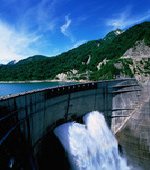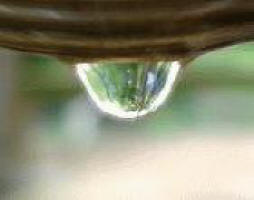 Thirsty Jordan will struggle for water this summer
Thirsty Jordan will struggle for water this summer
Jordan is this year facing a severe drought, the likes of which it has not witnessed in decades. The government is scrambling to find means of coping by reducing supplies to households and spearheading a nationwide campaign to encourage rationing.
Rivers and lakes are a rare commodity in this desert kingdom, with most of the water supply coming from dams that collect water during the rainy winter season or from springs that have been siphoning off the kingdom's underground reserves.
A disappointing rainy season has left most of the country's dams half empty. Precipitation registered during the rainy season constituted only 57 percent of the long-term annual average of 8.3 billion cubic meters.
The poor rainfall has forced officials at the water authorities to cut the quantities of water pumped to farmers in the north and western regions. The available amount for irrigation is 130 million cubic meters (mcm), while actual needs are estimated at 180 mcm.
The desert kingdom shares the spoils of the Yarmouk and Jordan rivers with its powerful neighbors, Syria and Israel respectively.
Agreements have been inked by officials from the three countries on the amounts the kingdom should receive, but Jordanian officials complain both neighbors rarely stick to the agreements on a regular basis.
Officials in Amman say every drop will be needed this hot, dry summer, hoping Damascus and Jerusalem will meet promises to pump the kingdom its share of water.
Following a rare visit by King Abdallah to Syria last year, relations between the two Arab neighbors improved after years of tension over regional issues, mainly Lebanon. Syria promised it would pump Jordan's share of the Yarmouk this summer, nearly 60 mcm. Jordanians are now concerned Syria will drag its heels on sending the required amount, bearing in mind that the Hashemite Kingdom recently boycotted the Arab League summit in Damascus, along with Saudi Arabia and Egypt. The main river here is the biblically renowned Jordan, from which the kingdom took its name. Once roaring in the Jordan Valley during the 1950s and 1960s, the river turned into a wispy stream of water trickling through the farms, serving as a natural barrier between Jordan and Israel rather than a lifeline for the kingdom's residents. Most tributaries were diverted for industrial and farming proposes by neighboring Syria and Israel. Environmentalists also say it has become a dumping site for Israeli industrialists. Last year, Jordan faced a similar situation with drought, though less severe. Israel, which pumped the required amount to Jordan in 2007, will probably not reduce the amount of water mandated by the peace treaty between the countries, Israel Water Authority spokesman Uri Schor told the Associated Press. Jordan's drought is much worse than Israel's, he said. The kingdom reached an agreement with Israel on sharing water in the 1994 Wadi 'Araba peace treaty, whereby Jordan gets around 35 mcm, equivalent to 3 percent of the total amount of water streaming down the river. Israel holds the remaining 97%. Figures from the Ministry of Water and Irrigation in each country show the water consumption of one Israeli citizen to be equal to that of five Jordanians. An added burden is expected between June and September from nearly half a million Jordanian expatriates who return during the summer holidays. The available water for the capital this summer is estimated at around 70 mcm - well below the actual needs of Amman residents of 100 mcm, according to Ministry of Water spokesman Zu'bi To that end, the government has announced a contingency plan ranging from rationing supply to households by pumping once a week for five hours, to stopping supplying certain farms and encouraging others to grow less water-consuming vegetation.
| Contact information |
By THE MEDIA LINE/MOHAMMAD BEN HUSSEIN
(email: editors@jpost.com) |
|---|---|
| News type | Inbrief |
| File link |
http://www.jpost.com/servlet/Satellite?cid=1207649984158&pagename=JPost/JPArticle/ShowFull |
| Source of information | JPost.com |
| Subject(s) | AGRICULTURE , DRINKING WATER , DRINKING WATER AND SANITATION : COMMON PROCESSES OF PURIFICATION AND TREATMENT , HYDRAULICS - HYDROLOGY , POLICY-WATER POLICY AND WATER MANAGEMENT , RISKS AND CLIMATOLOGY , WATER DEMAND |
| Relation | http://www.emwis.net/countries/fol749974/country045975 |
| Geographical coverage | Jordan |
| News date | 18/04/2008 |
| Working language(s) | ENGLISH |
 you are not logged in
you are not logged in





